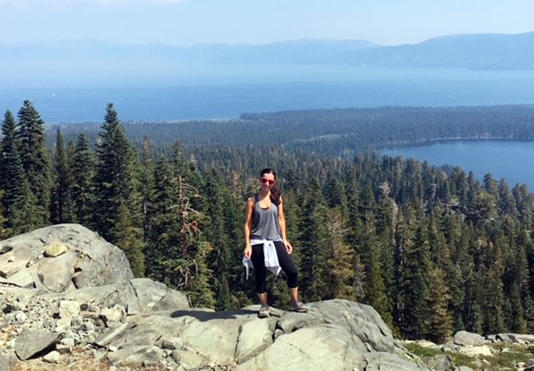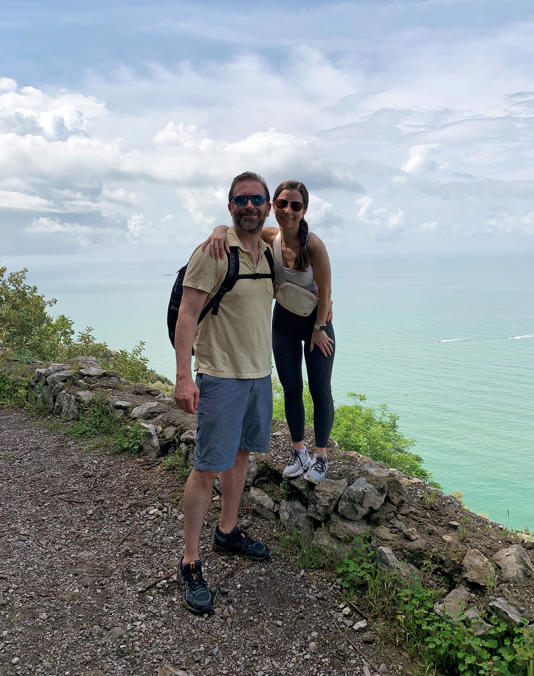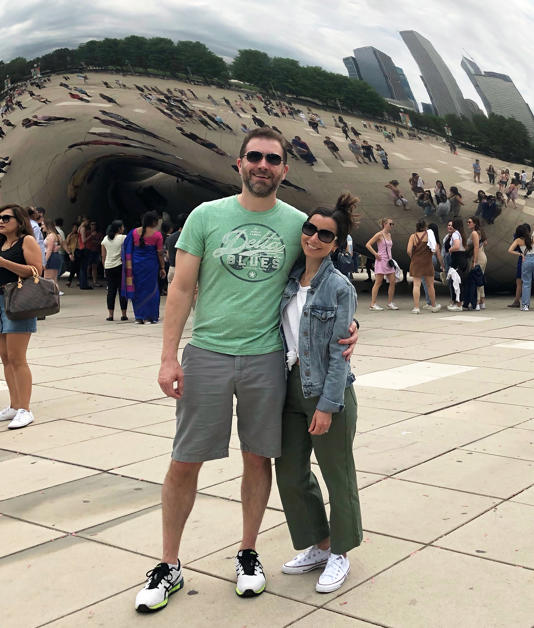
© Courtesy Morgan Bellock
How Cancer Groups Cope With Losing Members – Chicago Magazine
#FighterFriday: An Unexpected Wake-Up Call – Cancer Wellness
Morgan Bellock Scullion (@morganbellockscullion)
I am Morgan Bellock — MB PUBLIC RELATIONS
Story by Meghan Holohan
Morgan Bellock knows her story with ovarian cancer varies greatly from the traditional experience because it was found in stage 1. Ovarian cancer rarely has symptoms, so most people are diagnosed in later stages.
Soon after Morgan Bellock turned 34, she decided to freeze her eggs.
She wasn’t sure if she would be having children soon, and she thought it would be important to save them. As she went through the process, doctors discovered something surprising — Bellock had ovarian cancer.
“It was a big shock to me,” Bellock, now 40, from the Chicago area, tells TODAY.com.
“I didn’t know there was a giant ovarian cyst just sitting on one of my ovaries.”
Egg freezing leads to a surprise.
At the time Bellock pursued freezing her eggs in 2017, she was in a relationship with someone who took a job across the country, and she knew if they were to start a family,
it wouldn’t be any time soon.
“I thought to myself, if this is my person, our timeline is going to be significantly pushed back. And for me, it just felt better looking into freezing my eggs,” she says. “I was worried that two or three years would pass.” Some of her friends and family felt wary about Bellock pursuing fertility preservation, though.
“I remember being met with a lot of skepticism,” she says.
“I had a feeling in my gut, and ultimately I’m glad I did, and I feel like everyone questioning my position felt really bad about it.” As part of the egg-freezing process, Bellock needed to undergo an ultrasound.
During the scan, the doctor noticed she had a mass on her ovary.
At first, doctors thought she had a simple ovarian cyst, which are fairly common, often associated with the menstrual cycle and normally harmless. An article in the Cleveland Clinic Journal of Medicine estimates as many as 20% of women will get one.
Testing, however, revealed that Bellock’s cyst was complex, meaning it was filled with blood or some solid material. Her doctors worried that if she began taking the medication to stimulate her ovaries in order to freeze her eggs, it could cause the cyst to grow or rupture, so he recommended surgery.
“The story became crazy and weird,” she says.
“When they did the surgery, they removed the cyst. But then they also tested something that was hiding behind it, which was the cancerous tumor that none of the scans had shown.”
While the doctors had been worried about the cyst, they had no idea it covered “a very aggressive form of cancer,” Bellock recalls. Luckily, doctors found it early. It was a stage 1 teratoma, a type of tumor “often made up of several different types of tissue, such as hair, muscle and bone,” according to the National Cancer Institute.
“It was good news in some ways that we had caught it so soon, and we could treat it,” Bellock says. Doctors also told her that if the cancer had not been found accidentally,
she might not have experienced any symptoms for years.
By that time, her cancer would have been advanced.
“There’s a very real way that I could have not been here today, which is wild to think about,” she says. “I didn’t have any symptoms.” Doctors agreed that her ovary needed to be removed to treat the cancer. After surgery, she needed to recover before returning to egg freezing. It wasn’t until 2018, that doctors said she could begin again. By that point, she had broken up with her boyfriend, so she was pursing it alone.
“I only had one ovary, so as you can imagine, my desire to do it increased even more,” Bellock says. “It also felt even more disheartening, in terms of what the results were
going to be.”
She underwent several cycles to harvest eggs, ending up with 10.
“I stopped after a couple of cycles because I have had so many surgeries, so many drugs, and my body was done,” she says. “The mental state I was in was very different than when I thought I was going to be doing it.”
“Ovarian cancer is the second most common gynecological cancer,”
Dr. Zaid Al-Wahab, a gynecological oncologist at Corewell Hospital, in Royal Oak, Michigan, who did not treat Bellock, previously told TODAY.com.
“It is the most common cause of death from gynecological cancers.”

Freezing her eggs when she was 34 helped Morgan Bellock.
(Courtesy Morgan Bellock) © Courtesy Morgan Bellock
Be diagnosed with ovarian cancer at stage 1. Now married, she is grateful she has eggs frozen to try to start a family with her husband. That’s because, in about 80% of the cases, most ovarian cancers are not found until stage 3 or 4, he noted.
Bellock, like most people with early-stage ovarian cancer, had no symptoms.
“Even when it’s stage 3 or 4, symptoms are very vague,” Al-Wahab said.
Ovarian cancer symptoms include:
Bloating
Change in bowel habits
Back pain
Many people think of ovarian cancer as occurring in older women, but that’s not always the case.
“It can happen in much younger women so more awareness of ovarian cancer (is needed),” Al-Wahab said.
Life as a survivor
For the first year following her cancer diagnosis, Bellock needed to undergo an ultrasound every three months because that period has the highest chance of the cancer recurring. Gradually, the number of ultrasounds she needed reduced. It’s been five years, so she’s considered in remission and doesn’t need additional surveillance.
“You feel like you’re never going to get (into remission),” she says.
“I struggle a lot with survivorship. … There are many other women that I feel like are on the other side that have gone through way worse and way more.”
She’s became involved in The Breasties, a group for young people who had breast and gynecological cancers. That’s helped her grapple with her diagnosis and surviving cancer.
“It’s a nationwide organization of young women that are just very open and honest with the struggles and triumphs involved in this whole, crazy world ” she says. “That’s been such a blessing in terms of finding community and people who can really understand all the feelings that go on with cancer.”

She met someone new, and in 2021 they got married.
(Courtesy Morgan Bellock) © Provided by TODAY
They have pursued IVF to start a family, but it’s been “challenging.”
Bellock says she has no regrets about freezing her eggs.
“I knew I had to go in and pursue freezing my eggs, and ultimately it led me down this path, which I’m super grateful for,” she says. “It’s just a really wild way of getting that diagnosis.”
Morgan Bellock hopes others advocate for themselves if they notice something off with their health. She encourages others to speak up if they notice anything wrong with their body. “Trust your gut and advocate for yourself,” she says.
This article was originally published on TODAY.com

